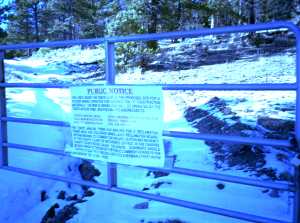Column by George Sibley
Morality – May 2002 – Colorado Central Magazine
I KEEP TRYING to get my mind around this matter of “evil.” Down on the ground here in Central Colorado, a lot of people seem to consider it a waste of time to even think about it; leave “evil” and its definition to the theologians in Washington.
But it is always in the back of my mind that this is supposed to be a democratic society, which means that if we aren’t talking about these things, then the sheep we have belled to be leaders of the flock can be excused for assuming that the silence they hear signifies approval. And now we have an unelected president who is talking about “evil” and how to handle it as though he were the high priest of some religion rather than just the guy who is supposed to be translating our will into whatever.
So, back to this matter of “evil.”
Because, “evil” has more or less been bound up with “terrorism” since September 11, it is worth noting that we have trouble defining terrorism too. Noam Chomsky, one of those really smart people that all normally smart humans secretly hate, wrote a pretty perceptive thing about “terrorism,” in which he acknowledged the relativism that’s apparent in efforts to define it.
Chomsky cites an “official” military-manual definition: “the calculated use of violence or the threat of violence to attain goals that are political, religious or ideological in nature…through intimidation, coercion or instilling fear.” But then he notes that the government cannot broadcast that definition because it’s what our military and CIA have been doing surreptitiously in Latin America and various other places around the world for the past century. So, he says, we basically do what humans have always done; we define “terrorism” as “the evil things they do to us,” whoever “they” are. If we do the same back to them — even “pre-emptively” as we said back in the Cold War era — it is something different. It’s “foreign policy.”
The same thing seems to be true where “evil” is concerned. If we arm ourselves with nuclear weapons — and even allow our president to say “we” (not me!) might use them — that’s one thing. But if other countries not friendly to us want to do the same thing, that makes them part of an “axis of evil.”
Should it be so easy? I had enough of a Christian upbringing for the word “evil” to have some resonance. Were I a committed Christian, I would worry about this Republican relativism; suppose God has — as all his revealed words indicate he does — a fairly explicit and absolute definition of “evil,” against which we all will be judged?
Consider, for example, the Biblical observation that “love of wealth is the root of all evil.” How can a corporation — which has wangled the law to where it is absolutely committed, first and foremost, above any considerations regarding human or environmental health to creating profit for its investors — be seen as anything but evil by the people of an allegedly Christian nation?
But loving wealth can’t be evil. That’s just — us. (And we’ve got to look after our sacred retirement plans! That’s just being financially responsible.)
For the Jeffersonian philistines like myself, there is another resonance to all this nationalistic relativism. Unlike the current crop of American leaders, I actually believe — more than I believe in any conception of God — in what we Americans have always called “government by law rather than by men.”
I see national law as just one imperfect step on the way toward some form of global governance whereby the things we all do to each other will be judged by some basic guidelines, until we achieve a situation where opportunity and justice are fairly distributed to all people. And in that light, government guidelines will require some definitive distinctions, applicable to all, about what’s good and what’s evil. I know, it’s an impossible dream, but I like it better than the dream of heaven.
SO EITHER WAY, in order to achieve either the kingdom of heaven or justice on earth, we are going to have to develop, and consent to be judged by, some fairly explicit criteria for what is “evil.” Under God, or under the United Nations, if not both.
From my Bible School days, I remember the story of Sodom and Gomorrah, evil cities which were destroyed by God. I wondered, even then: Was everyone in those places truly “evil”? Were there no normal ordinary people, just going along to get along?
In other words, were most of the people of Sodom and Gomorrah like most of the people of America today? Were they basically good-hearted people who were too congenial to just say no to the angry and aggressively insecure alpha types who, as always, insisted on being in charge? How did their leaders impose their paranoia on everyone else? Did all of those good-hearted people allow themselves to be led into, and destroyed by, evil because it was either too much trouble or it just seemed too presumptuous to stand up and say, “Wait a minute: we need to think this through”?
George Sibley organizes, teaches, and writes in Gunnison.

